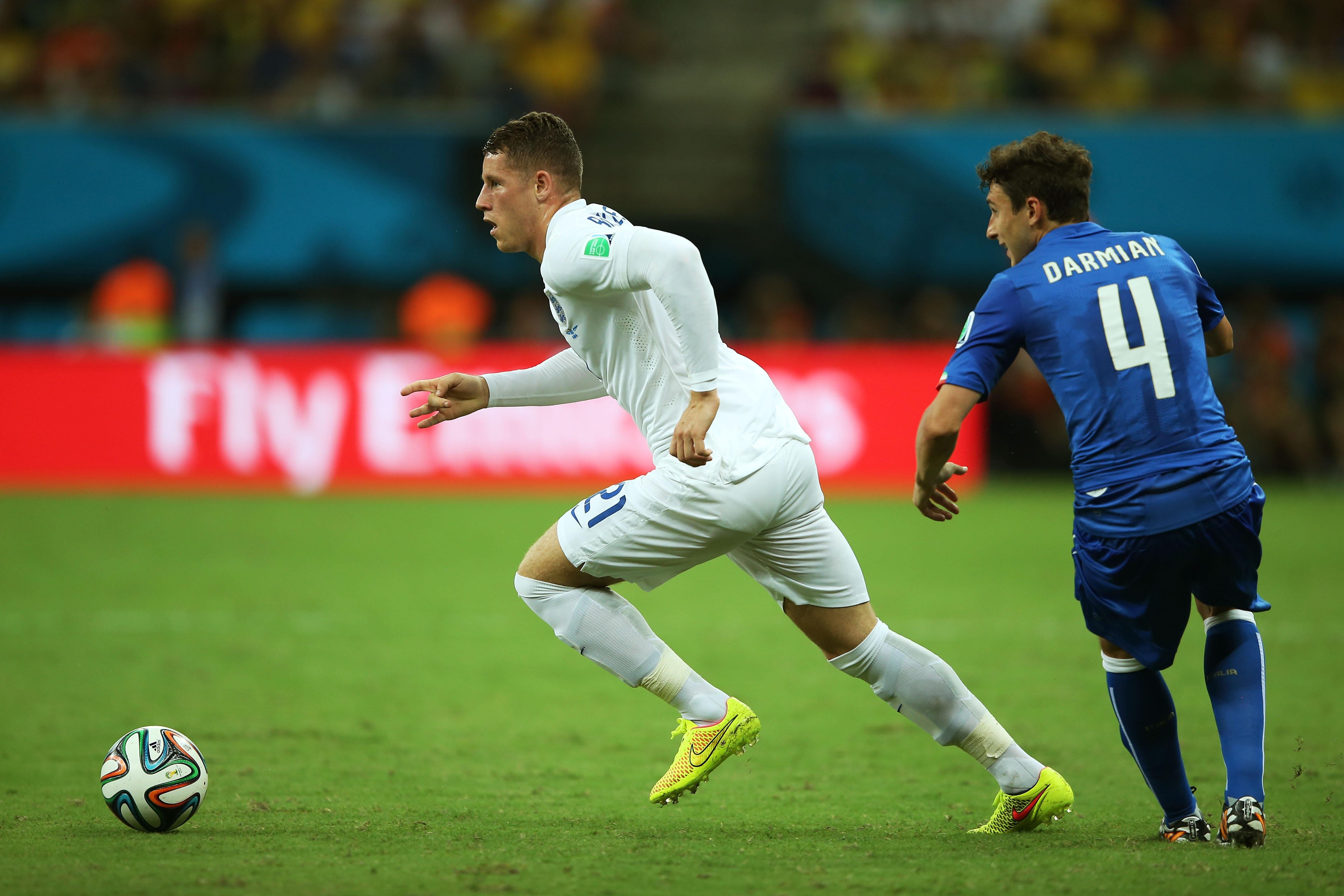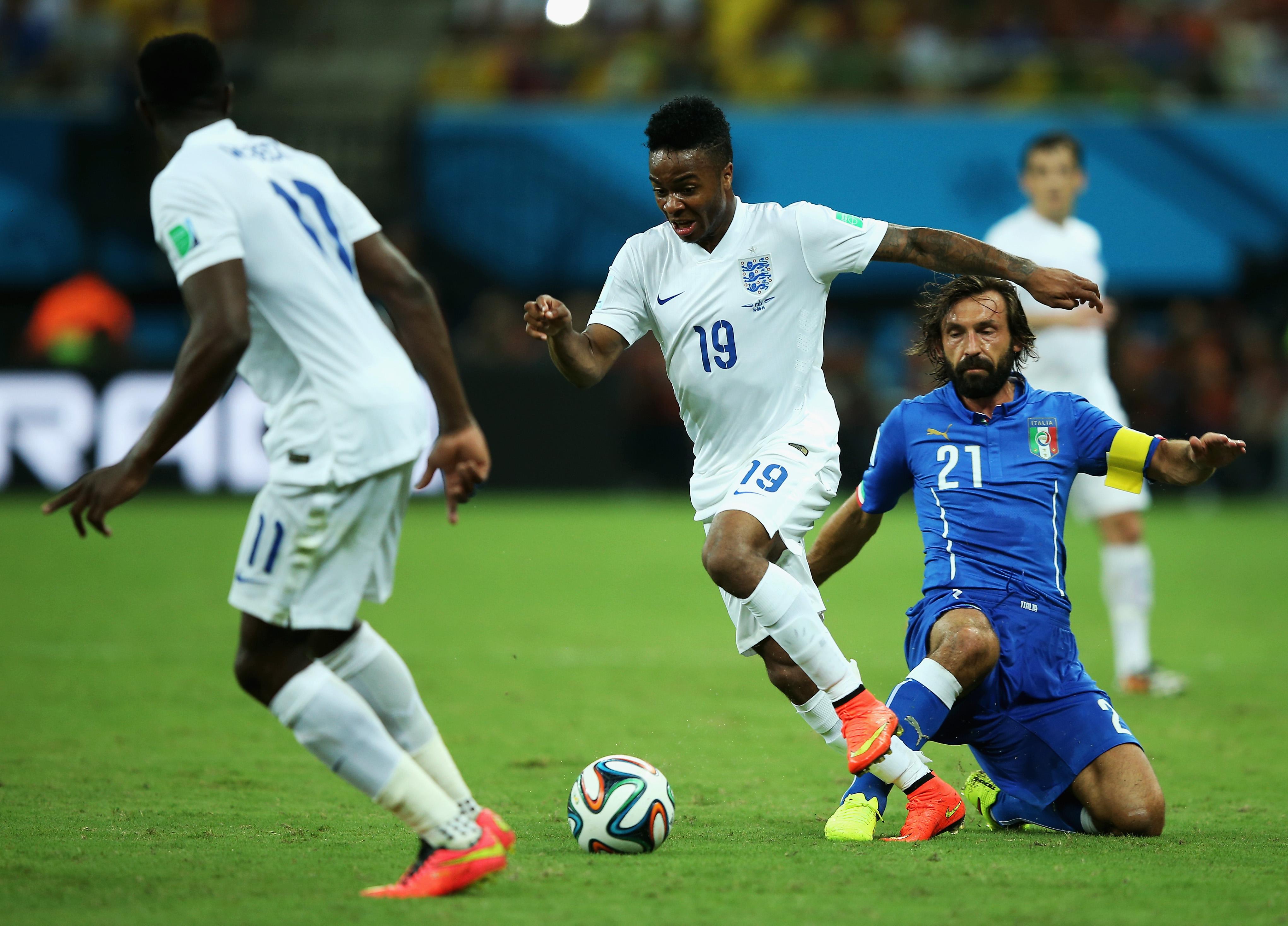There are two things that fans talk about after a soccer match, the result and the performance. Some people only care about the result: whether your team got a needed win. Others can’t abide a poor performance: If a team wins while looking terrible, where’s the joy in that? In soccer, it’s very common to win despite a mediocre performance—see the U.S. national team. And it’s also quite common to lose while looking creative and dynamic—see England against Italy. But without both consistent results and performances, you’re not likely to go very far. And another thing: Without both consistent results and performances, your coach will likely get fired.
Last Saturday, England looked as good as it has at any World Cup in a decade. Statistically, the Three Lions dominated with 18 shots to Italy’s 12, eight shots on target to five, twice as many dangerous attacks as the Italians, and nine corners to two. The team had a reported 91 percent pass-completion rate, its best mark in a World Cup game since those statistics started to be collected in 1966.
But unluckily for Roy Hodgson’s team, the result didn’t match the performance and England suffered a 2–1 loss. “As we came off the pitch, we weren’t thinking anything other than the team played pretty well, but we got the fine lines wrong,” said former England defender and current assistant coach Gary Neville.
England had an aggressive game plan, starting three attacking midfielders and a striker, and the front line looked exciting and threatening throughout. Liverpool duo Raheem Sterling and Daniel Sturridge peppered the Italians with shots. Sturridge scored England’s lone goal, but it was the 19-year-old Sterling who looked especially dangerous. Coming into the tournament, there was uncertainty about whether Sterling would even start. But as ESPN announcer Ian Darke noted, the attacking midfielder marauded through the Italian defense “like they weren’t there.” The Guardian is now calling him “undroppable” and “the symbol of the new England,” with its fearless attacking play.
Fearless is a word that hasn’t often been applied to England. At the last two World Cups, the team looked turgid and nervous. The modus operandi was to cling on to every lead, every draw, and every chance to take the game to penalties, where they would inevitably lose. And yet, the nation went into both tournaments with absurdly unrealistic expectations that a so-called golden generation would lead them to the nation’s first World Cup victory since 1966. Even after the team’s devastating defeat in 2006, defender Ashley Cole was still saying things like “on our day, without doubt, we’re better than them, France, Germany and Italy. The World Cup had our name written all over it, and it should have been our time.”
The nation has a long history of building up teams beyond their capacity to perform. In his book Those Feet: A Sensual History of English Football, David Winner argues that this bombast stems from the nation’s status as the self-proclaimed inventors of the sport. He quotes soccer journalist Brian Glanville on why the English had been overtaken by European and South American rivals.
The story of British football and the foreign challenge is the story of vast superiority, sacrificed through stupidity, short-sightedness, and wanton insularity. It is a story of shamefully wasted talent, extraordinary complacency and infinite self-deception. … Its causes are various; many immediate, a few fundamental, all of them avoidable. Foreign football has indeed grown into a strong man during the past 50 years, but the fact that British football has long since lost its supremacy is as much through its own failings as through foreign improvement.
These words were written in 1955. Ever since, English fans have fluctuated between overhyped expectations and overwrought self-loathing.
This year, the Three Lions entered the tournament with virtually zero expectations. A pre-World Cup Ipsos poll showed that 3 percent of the English people thought their boys would win. That compares with 7 percent of Americans who, absurdly, thought their team would win the tournament. And it’s only slightly more optimistic than Jürgen Klinsmann’s pre-tournament prognostication for the United States (a 0 percent chance to win).

Photo by Richard Heathcote/Getty Images
Yet England is more of a threat in 2014 than it ever was during the “golden generation” era. The previous England coach, Fabio Capello, said his team’s problems were more psychological than technical and stemmed from the “shirt weighing heavy” on his players. That burden does not yet exist for inexperienced up-and-comers like Sterling and Everton’s Ross Barkley.
Still, some in the English press demand that the team ask more of itself. “[A] dignified defeat is still a defeat and the England manager should not expect so much understanding and kindness if there is the same outcome against Uruguay in São Paulo on Thursday,” Daniel Taylor of the Guardian wrote after the loss to Italy.
I polled a few of my ex-colleagues from my days as a sports journalist in London to see if they felt similarly. What I found was that Taylor’s view is an outlier. Given the team’s callowness, performance will likely be given more weight than results in 2014.
“Most people in England would at this point take three entertaining games in a reasonably tough group and then get eliminated, rather than grind their way through to a second-round exit as per normal,” says Tony Mabert, ESPN FC news editor.
“The national mood is very positive, far more so than when England took Italy to penalties at Euro 2012,” says Alex Chick, managing editor of Eurosport-Yahoo and author of the superb soccer blog Armchair Pundit. “Yes, we lost, but it wasn’t a capitulation, it wasn’t embarrassing, and plenty of players emerged with credit.”
England hasn’t exited a World Cup in the first round since 1958, and if it does this year, Chick admits that fans might not be so forgiving of Hodgson or the England team.
“There has, however, been a very significant readjustment of national expectation since the bombastic days of 2006 when we were expected to go to Germany and sweep everyone aside,” he says. “My view is that although a turgid 0–0 would have put us in a better position, we saw a good performance against Italy that, with some luck, could easily have ended differently.”
Perhaps just as important as the lowered national expectations is the current national appreciation for a team focused on playing well rather than just winning or drawing at any cost.
“This country used to be an unbearable place at World Cup time—every car had a tatty England flag flying from the window, and the players left the country as conquering heroes and returned as frauds as hubristic media coverage turned quickly to recrimination,” says Chick. “It seems decades of painful exits and unmet expectations have finally knocked some sense into us. We know we won’t win this tournament, so why not pick a young, likeable team, play some good football and see where it gets you?”
My soccer journalist friends conceded that it is easy to take a realistic approach before the team has been eliminated. But Chick says there’s a wide acceptance that it could take decades, not weeks, for England to climb back to the top of international football. If that realism holds, it would be a refreshing change for the country. And if an electrifying young England team can upend those newly lowered expectations in 2014, 2018, or 2022, then the English will experience something they haven’t had since 1966: a pleasant surprise.
